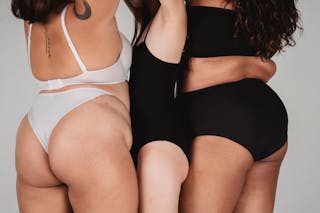Breaking Down Black Women Sex Stereotypes: A Conversation with Sex Educator Rukiat
Are you ready to challenge the status quo and break down stereotypes about sex? We sat down with sex educator Rukiat to dive deep into the world of erotic roleplay and AI. Prepare to have your mind opened and your preconceptions shattered as we explore the possibilities of breaking free from traditional expectations. Get ready to be enlightened and inspired by Rukiat's progressive views and valuable insights. Check out the full interview here.
In the world of dating, there are many stereotypes and misconceptions about Black women and their sexuality. These stereotypes often stem from harmful and racist beliefs, and they can have a significant impact on how Black women are perceived in the dating world. To shed light on this issue, we sat down with renowned sex educator Rukiat to discuss the impact of sex stereotypes on Black women and how we can work to dismantle them.
Check out the amazing cash for sex tape discount at Devilish Desire and try it out for a thrilling experience.
The Impact of Sex Stereotypes on Black Women
Check out this dating app for African American professionals and find your perfect match today.
Rukiat began by highlighting the damaging impact that sex stereotypes have on Black women. "These stereotypes are often rooted in historical and systemic racism," she explained. "They perpetuate the idea that Black women are hypersexual and promiscuous, which can lead to objectification and dehumanization."
Discover honest reviews about sex-like-real products
These stereotypes can manifest in various ways, from fetishization to the assumption that Black women are more sexually experienced or aggressive than women of other races. Rukiat stressed that these stereotypes not only harm Black women's self-esteem and mental health but also affect their dating experiences. "Black women may feel pressured to conform to these stereotypes or struggle to find partners who see them as individuals rather than as sexual objects," she said.
Dismantling Stereotypes Through Education and Empowerment
When asked about how we can combat these harmful stereotypes, Rukiat emphasized the importance of education and empowerment. "It's crucial to challenge these stereotypes and educate others about their harmful effects," she stated. "This includes having open and honest conversations about race, gender, and sexuality, as well as actively working to unlearn and dismantle our own biases."
Rukiat also highlighted the need for Black women to reclaim their sexuality and assert their agency. "Empowerment is key to dismantling these stereotypes," she said. "Black women should feel empowered to express their sexuality on their own terms and demand respect and equality in their relationships."
The Role of Dating Platforms in Challenging Stereotypes
In the age of online dating, dating platforms play a significant role in shaping our perceptions of others. When asked about the role of dating platforms in challenging sex stereotypes, Rukiat stressed the importance of diversity and inclusion. "Dating platforms should actively work to combat racism and sexism within their communities," she said. "This includes implementing policies to prevent harassment and discrimination, as well as promoting diversity and representation in their marketing and user base."
Rukiat also emphasized the need for dating platforms to provide resources and support for users who may be facing discrimination or stereotyping. "It's essential for dating platforms to create a safe and inclusive space for all users, regardless of their race or gender," she explained. "This can include providing educational materials, support groups, and access to counseling services."
Moving Forward: Challenging Stereotypes and Fostering Inclusivity
As our conversation came to a close, Rukiat shared her thoughts on the steps we can take to challenge sex stereotypes and foster inclusivity in the dating world. "It's essential for all of us to actively work to challenge our own biases and educate ourselves about the experiences of others," she said. "This includes listening to and uplifting the voices of Black women and other marginalized groups, as well as advocating for systemic change in our communities and institutions."
Rukiat also highlighted the importance of fostering a culture of empathy and understanding in our interactions with others. "We must strive to be empathetic and open-minded in our relationships, and actively work to create a dating culture that celebrates diversity and respects the autonomy and agency of all individuals," she explained.
In conclusion, our conversation with Rukiat shed light on the harmful impact of sex stereotypes on Black women and the steps we can take to challenge these stereotypes and foster inclusivity in the dating world. By actively working to challenge our own biases, educate ourselves, and advocate for systemic change, we can create a dating culture that celebrates diversity and respects the agency of all individuals, regardless of their race or gender.
- https://hookupsites.getweps.com/posts/best-sex-toy-advent-calendars-for-2023/
- https://local-personals.thehottieandthenottie.com/posts/sex-toys-for-disabled-people-tested-best-disabilityfriendly-vibrators/
- https://sexting.timebombrecordings.com/posts/bisexual-how-to-know-if-youre-bisexual/
- https://local-personals.ua-sex.com/posts/wonder-woman-poster-has-fans-thinking-shes-gay-or-bisexual/
- https://online-personals.themountaintopplay.com/posts/30-breakup-texts-to-dnd-any-relationship/
- https://online-sex.themountaintopplay.com/posts/15-signs-the-guy-youre-dating-isnt-the-woke-bae-he-thinks-he-is/
- https://location-dating.timebombrecordings.com/posts/30-day-sex-challenge-i-attempted-the-reddit-sex-challenge-and-it-was-hard/
- https://singles.thehottieandthenottie.com/posts/its-unicorn-season-heres-how-to-survive-as-a-bisexual-woman/
- https://fuck-apps.themountaintopplay.com/posts/this-simple-sex-tip-completely-changed-how-i-think-about-blow-jobs/
- https://dating-blog.thehottieandthenottie.com/posts/abstinence-stories-what-first-time-wedding-night-sex-is-like/
- https://online-dating.campsupernow.com/posts/am-i-asexual/
- https://personals-website.getweps.com/posts/first-time-sex-with-a-man-12-women-on-what-its-like-to-be-a-guys-first-time/
- https://dating-blog.ua-sex.com/posts/why-twitter-is-being-accused-of-deliberate-bisexual-erasure/
- https://hookup-website.campsupernow.com/posts/lovehoney-sex-toys-16-best-lovehoney-vibrators/
